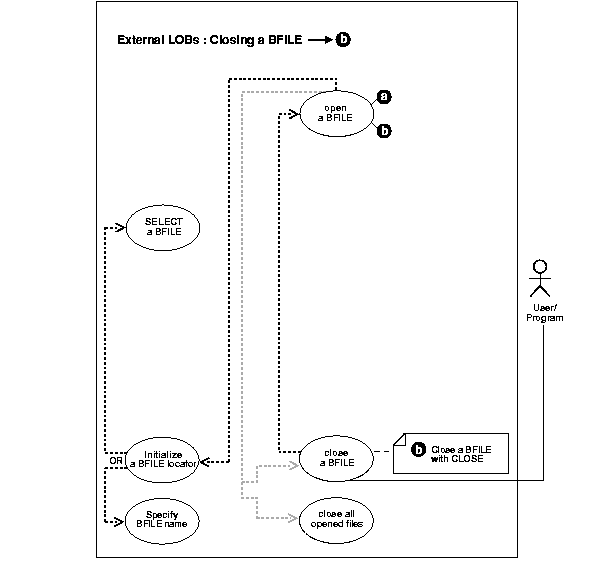Release 1 (9.0.1)
Part Number A88879-01
Home |
Book List |
Contents |
Index | Master Index | Feedback |
| Oracle9i Application Developer's Guide - Large Objects (LOBs) Release 1 (9.0.1) Part Number A88879-01 |
|
External LOBs (BFILEs), 39 of 41

This procedure describes how to close a BFILE with CLOSE.
Not applicable.
See Chapter 3, "LOB Support in Different Programmatic Environments" for a list of available functions in each programmatic environment. Use the following syntax references for each programmatic environment:
This example should be read in conjunction with the example of opening a BFILE -- in this case, closing the BFILE associated with Lincoln_photo.
/* Note that the example procedure closeBFILE_procTwo is not part of the DBMS_LOB package: */ CREATE OR REPLACE PROCEDURE closeBFILE_procTwo IS File_loc BFILE := BFILENAME('PHOTO_DIR', 'Lincoln_photo'); BEGIN DBMS_LOB.OPEN(File_loc, DBMS_LOB.LOB_READONLY); /* ...Do some processing. */ DBMS_LOB.CLOSE(File_loc); END;
void BfileClose(envhp, errhp, svchp, stmthp) OCIEnv *envhp; OCIError *errhp; OCISvcCtx *svchp; OCIStmt *stmthp; { OCILobLocator *bfile_loc; /* Allocate the locator descriptors */ (void) OCIDescriptorAlloc((dvoid *) envhp, (dvoid **) &bfile_loc, (ub4) OCI_DTYPE_FILE, (size_t) 0, (dvoid **) 0); checkerr(errhp, OCILobFileSetName(envhp, errhp, &bfile_loc, (OraText *) "PHOTO_DIR", (ub2) strlen("PHOTO_DIR"), (OraText *) "Lincoln_photo", (ub2) strlen("Lincoln_photo"))); checkerr(errhp, OCILobOpen(svchp, errhp, bfile_loc, (ub1) OCI_LOB_READONLY)); checkerr(errhp, OCILobClose(svchp, errhp, bfile_loc)); /* Free the locator descriptor */ OCIDescriptorFree((dvoid *)bfile_loc, (ub4)OCI_DTYPE_FILE); }
This script is also provided in:
$ORACLE_HOME/rdbms/demo/lobs/cobol/fclose
IDENTIFICATION DIVISION. PROGRAM-ID. BFILE-CLOSE. ENVIRONMENT DIVISION. DATA DIVISION. WORKING-STORAGE SECTION. 01 USERID PIC X(11) VALUES "SAMP/SAMP". 01 BFILE1 SQL-BFILE. 01 DIR-ALIAS PIC X(30) VARYING. 01 FNAME PIC X(20) VARYING. 01 ORASLNRD PIC 9(4). EXEC SQL INCLUDE SQLCA END-EXEC. EXEC ORACLE OPTION (ORACA=YES) END-EXEC. EXEC SQL INCLUDE ORACA END-EXEC. PROCEDURE DIVISION. BFILE-CLOSE. EXEC SQL WHENEVER SQLERROR DO PERFORM SQL-ERROR END-EXEC. EXEC SQL CONNECT :USERID END-EXEC. * Allocate and initialize the BFILE locators: EXEC SQL ALLOCATE :BFILE1 END-EXEC. * Set up the directory and file information: MOVE "PHOTO_DIR" TO DIR-ALIAS-ARR. MOVE 9 TO DIR-ALIAS-LEN. MOVE "Lincoln_photo" TO FNAME-ARR. MOVE 13 TO FNAME-LEN. EXEC SQL LOB FILE SET :BFILE1 DIRECTORY = :DIR-ALIAS, FILENAME = :FNAME END-EXEC. EXEC SQL LOB OPEN :BFILE1 READ ONLY END-EXEC. * Close the LOB: EXEC SQL LOB CLOSE :BFILE1 END-EXEC. * And free the LOB locator: EXEC SQL FREE :BFILE1 END-EXEC. STOP RUN. SQL-ERROR. EXEC SQL WHENEVER SQLERROR CONTINUE END-EXEC. MOVE ORASLNR TO ORASLNRD. DISPLAY " ". DISPLAY "ORACLE ERROR DETECTED ON LINE ", ORASLNRD, ":". DISPLAY " ". DISPLAY SQLERRMC. EXEC SQL ROLLBACK WORK RELEASE END-EXEC. STOP RUN.
This script is also provided in:
$ORACLE_HOME/rdbms/demo/lobs/proc/fclose
/* Pro*C/C++ has only one form of CLOSE for BFILEs. Pro*C/C++ has no FILE CLOSE statement. A simple CLOSE statement is used instead: */ #include <oci.h> #include <stdio.h> #include <sqlca.h> void Sample_Error() { EXEC SQL WHENEVER SQLERROR CONTINUE; printf("%.*s\n", sqlca.sqlerrm.sqlerrml, sqlca.sqlerrm.sqlerrmc); EXEC SQL ROLLBACK WORK RELEASE; exit(1); } void closeBFILE_proc() { OCIBFileLocator *Lob_loc; char *Dir = "PHOTO_DIR", *Name = "Lincoln_photo"; EXEC SQL WHENEVER SQLERROR DO Sample_Error(); EXEC SQL ALLOCATE :Lob_loc; EXEC SQL LOB FILE SET :Lob_loc DIRECTORY = :Dir, FILENAME = :Name; EXEC SQL LOB OPEN :Lob_loc READ ONLY; /* ... Do some processing */ EXEC SQL LOB CLOSE :Lob_loc; EXEC SQL FREE :Lob_loc; } void main() { char *samp = "samp/samp"; EXEC SQL CONNECT :samp; closeBFILE_proc(); EXEC SQL ROLLBACK WORK RELEASE; }
Dim MySession As OraSession Dim OraDb As OraDatabase Dim OraDyn As OraDynaset, OraMusic As OraBfile, amount_read%, chunksize%, chunk Set MySession = CreateObject("OracleInProcServer.XOraSession") Set OraDb = MySession.OpenDatabase("exampledb", "scott/tiger", 0&) chunksize = 32767 Set OraDyn = OraDb.CreateDynaset("select * from Multimedia_tab", ORADYN_DEFAULT) Set OraMusic = OraDyn.Fields("Music").Value If OraMusic.IsOpen Then 'Processing given that the file is already open OraMusic.Close End If
import java.io.InputStream; import java.io.OutputStream; // Core JDBC classes: import java.sql.DriverManager; import java.sql.Connection; import java.sql.Statement; import java.sql.PreparedStatement; import java.sql.ResultSet; import java.sql.SQLException; // Oracle Specific JDBC classes: import oracle.sql.*; import oracle.jdbc.driver.*; public class Ex4_48 { public static void main (String args []) throws Exception { // Load the Oracle JDBC driver: DriverManager.registerDriver(new oracle.jdbc.driver.OracleDriver()); // Connect to the database: Connection conn = DriverManager.getConnection ("jdbc:oracle:oci8:@", "samp", "samp"); conn.setAutoCommit (false); // Create a Statement: Statement stmt = conn.createStatement (); try { BFILE src_lob = null; ResultSet rset = null; rset = stmt.executeQuery ( "SELECT BFILENAME('PHOTO_DIR', 'Lincoln_photo') FROM DUAL"); OracleCallableStatement cstmt = null; if (rset.next()) { src_lob = ((OracleResultSet)rset).getBFILE (1); cstmt = (OracleCallableStatement)conn.prepareCall ("begin dbms_lob.open (?,dbms_lob.lob_readonly); end;"); cstmt.registerOutParameter(1,OracleTypes.BFILE); cstmt.setBFILE (1, src_lob); cstmt.execute(); src_lob = cstmt.getBFILE(1); System.out.println ("the file is now open"); } // Close the BFILE, statement and connection: cstmt = (OracleCallableStatement) conn.prepareCall ("begin dbms_lob.close(?); end;"); cstmt.setBFILE(1,src_lob); cstmt.execute(); stmt.close(); conn.commit(); conn.close(); } catch (SQLException e) { e.printStackTrace(); } } }
|
|
 Copyright © 1996-2001, Oracle Corporation. All Rights Reserved. |
|